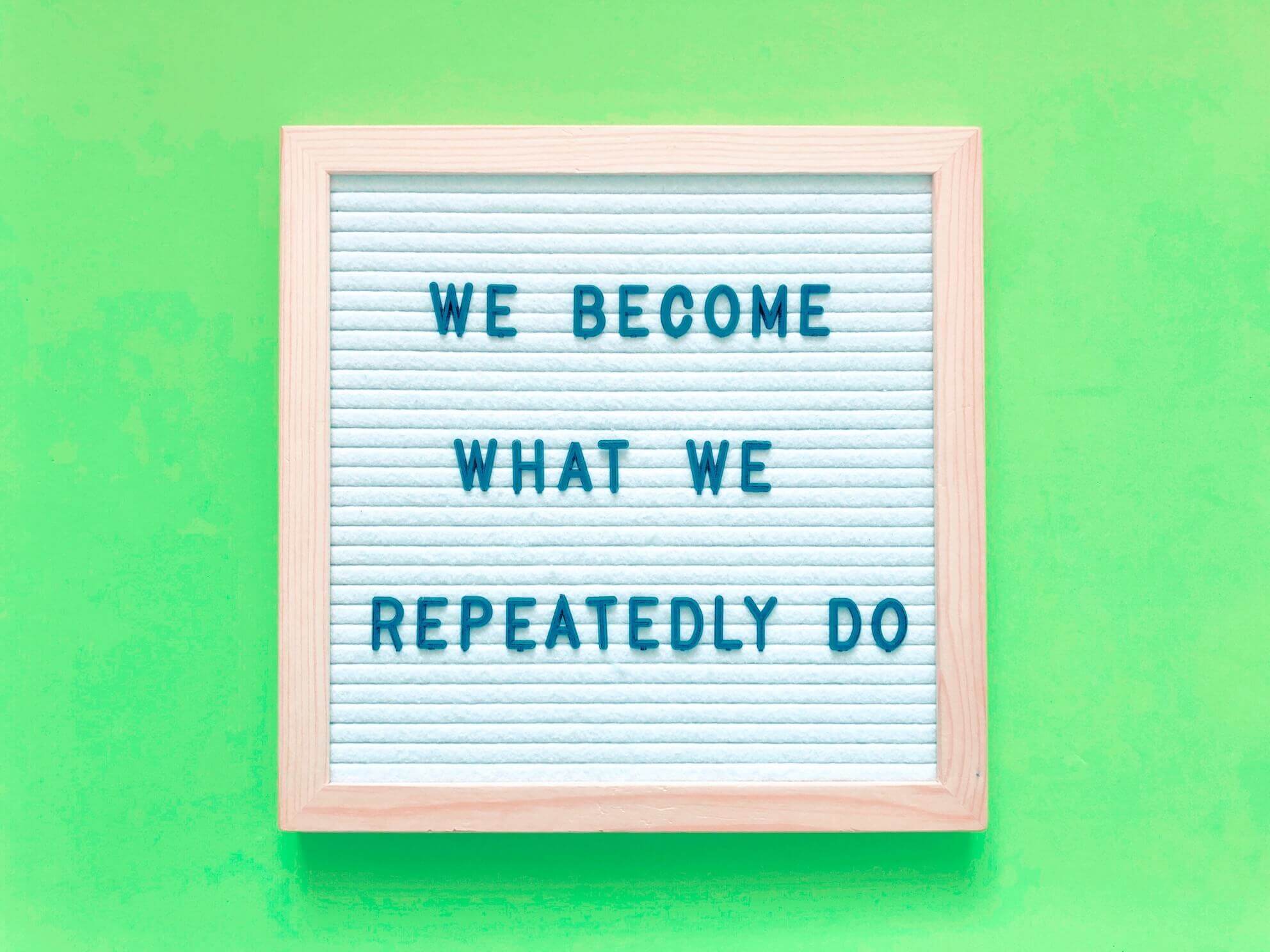Habits are an essential part of our daily lives. They shape our behaviors, attitudes, and ultimately, our success. The habits we form can either help us achieve our goals or hold us back from reaching our full potential. In fact, studies show that up to 40% of our daily actions are based on habits. Therefore, developing positive habits is crucial to our personal and professional growth. Habits are like building blocks that shape our character and mold us into the people we want to become. They help us create structure and consistency in our lives, which is essential for achieving success. In this article, we will explore why habits are important in our development and how they can help us lead happier, healthier, and more productive lives. So, let’s dive in and discover the power of habits together.
The importance of habits in personal development
Habits play a crucial role in personal development. They are the small, but powerful actions that we repeat on a daily basis, which eventually shape our lives. It is said that successful people are not born, but they are made through the power of their habits. Habits are the building blocks that help us achieve our goals, create positive changes in our lives, and become better versions of ourselves. Developing good habits can be a challenging task, but it is worth it in the long run. Habits that are aligned with our goals can help us stay focused, motivated, and disciplined. They create a sense of consistency and routine in our lives, which makes it easier to achieve our desired outcomes. For example, if we want to improve our physical health, we can start small by developing a habit of exercising for 20-30 minutes every day. This habit, when repeated consistently, can lead to improved fitness levels, increased energy, and better overall health. On the other hand, bad habits can hinder our personal growth and development. Habits such as procrastination, negative self-talk, and unhealthy eating can prevent us from reaching our full potential. These habits create a sense of complacency and lethargy in our lives, which can lead to a lack of motivation and drive. It is important to identify and replace these bad habits with positive ones that align with our goals and aspirations.

How habits shape our attitudes and behaviors
Have you ever wondered why we do what we do? Why do we have certain attitudes, beliefs, and behaviors? Well, it all comes down to our habits. Habits are powerful and play a significant role in shaping our lives. They are the things we do automatically without thinking, and they can either make or break us. Our habits are formed through repetition and consistency, and they shape our attitudes and behaviors over time. Our attitudes are a reflection of our habits. If we have a habit of looking at the positive side of things, we tend to have a positive attitude. On the other hand, if we have a habit of always looking at the negative side of things, we tend to have a negative attitude. Our habits can also shape our behaviors. For example, if we have a habit of exercising regularly, we tend to have a healthier lifestyle. However, if we have a habit of eating junk food and not exercising, we tend to have an unhealthy lifestyle. The good news is that we can change our habits and, in turn, change our attitudes and behaviors. It all starts with awareness. We need to be aware of our habits and be willing to change them. We can start by identifying our bad habits and replacing them with good habits. For example, if we have a habit of procrastinating, we can replace it with a habit of taking action right away. If we have a habit of negative self-talk, we can replace it with a habit of positive self-talk. It’s important to note that changing our habits takes time and effort. It’s not something that can be done overnight. It takes consistent effort and dedication to create new habits and break old ones. However, the benefits of changing our habits are well worth the effort. By changing our habits, we can improve our attitudes, behaviors, and ultimately, our lives.

How to develop positive habits
Developing positive habits is an essential aspect of personal growth and success. Habits are the building blocks of our lives, and they determine our overall well-being. Whether it’s starting a new exercise routine or breaking a bad habit, developing positive habits is a critical step toward achieving our goals. In this day and age where we are constantly bombarded with distractions and temptations, developing positive habits can be a challenging task. However, with the right mindset and approach, it is possible to develop positive habits that stick. One of the key ways to develop positive habits is to start small. Often, we set lofty goals for ourselves, which can be overwhelming and discouraging. Instead, focus on making small changes that are easy to implement and maintain. For example, if you want to start exercising, begin with a 10-minute walk every day and gradually increase the duration and intensity over time. This approach allows you to build momentum and confidence, which is crucial in developing positive habits. Another critical aspect of developing positive habits is consistency. Habits are formed through repeated actions, so it’s vital to be consistent in your efforts. Create a routine and stick to it, even when it’s challenging. Consistency helps to reinforce the habit and makes it easier to maintain over time. It’s also essential to track your progress to stay motivated and accountable. Keep a journal or use an app to monitor your progress and celebrate your successes.

Strategies for breaking negative habits
Breaking negative habits can be a challenging but incredibly rewarding process. Whether it’s biting your nails, smoking cigarettes, or procrastinating, these habits can have a significant impact on our lives and mental health. Fortunately, there are strategies that can help us overcome these habits and lead us toward a healthier and happier lifestyle. The first step in breaking negative habits is to identify the triggers that cause us to engage in them. These triggers could be emotional or environmental, and they play a crucial role in reinforcing the habit. Once we’ve identified the triggers, we can start to develop a plan to avoid or mitigate them. For example, if stress triggers our habit of biting our nails, we can find other ways to manage stress, such as exercise or meditation. Another effective strategy is to replace negative habits with positive ones. When we engage in negative habits, we are seeking some kind of reward, whether it’s stress relief or pleasure. By replacing these habits with positive ones, we can still achieve the same rewards but in a healthier way. For example, instead of smoking cigarettes, we could take a walk or practice deep breathing exercises. It’s also important to have a support system in place when breaking negative habits. Surrounding ourselves with people who are supportive and understanding can make all the difference in our journey towards breaking negative habits. They can provide encouragement, accountability, and motivation when we need it most.

Habits for professional growth and success
Professional growth and success are two things that every individual aspires to achieve in their career. However, it takes more than just hard work and dedication to reach the top. It requires a certain set of habits that can help an individual stay focused, motivated, and productive. In this fast-paced world, developing habits that can help you grow as a professional is not only important but also necessary. One of the most important habits for professional growth is continuous learning. In today’s competitive world, it’s essential to keep yourself updated with the latest trends and technologies in your industry. Whether it’s attending conferences, taking courses, or reading industry-related books and articles, every effort you make towards learning can help you stay ahead of the game. Another crucial habit for professional success is time management. Time is a precious commodity, and managing it effectively can make a huge difference in your career. Setting clear goals, prioritizing tasks, and avoiding distractions can help you stay on track and achieve your targets. Networking is also an essential habit for professional growth. Building relationships with people in your industry can help you gain access to new opportunities, learn from others, and expand your knowledge and skills. Networking can be done both online and offline, and it’s essential to make a genuine effort to connect with people and build lasting relationships.

Conclusion
Finally, developing positive habits requires a positive mindset. Believe in yourself and your ability to make positive changes in your life. Focus on the benefits of the habit you want to develop, rather than the challenges. Surround yourself with positive people who support your goals and encourage you to succeed. With a positive mindset, anything is possible. In conclusion, developing positive habits is a crucial step towards personal growth and success. By starting small, being consistent, and maintaining a positive mindset, you can develop positive habits that will transform your life. Remember, developing positive habits is a journey, not a destination. Embrace the process, stay committed, and enjoy the rewards of a happier, healthier, and more fulfilling life.





